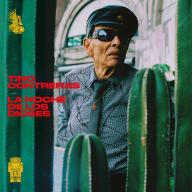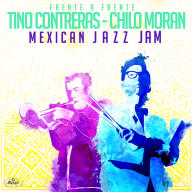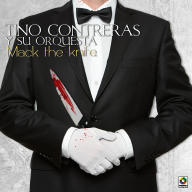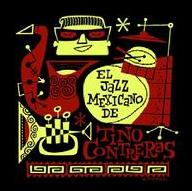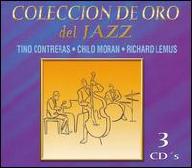Fortino Contreras González was born into a musical family in Ciudad Juárez, Chihuahua, Mexico on April 3, 1924. Contreras formed his first band, Cadetes del Swing, at the tender age of 15 and made his professional debut with Luis Arcaraz's Latin swing orchestra in the early '40s. During this period, he also played with fellow Mexican jazz and exotica maverick Juan García Esquivel. In 1953, Contreras cut Volado por los Merengues, his debut outing as a bandleader. Musically inspired by a trip to the Dominican Republic, it was clear from the outset that he was never going to be a straight-ahead jazzer. The recording received national radio play and won Contreras a historic invitation: In 1954 he was asked to helm the drum chair on the first modern jazz recording from his own country. It was released as the triple-length Jazz en Mexico on Orfeon.
In 1957, Contreras formed the first iteration of his long-lived quartet. The subsequent stream of releases reflected an almost bewildering range of influences as he strove to meld jazz with Latin musical forms and instrumentation -- including Mesoamerican religious choral chants. He also explored lounge, European dance traditions, and folk music from every corner of the globe -- especially those from the Indian subcontinent and North Africa. These fusions reflected his band's globe-trotting itinerary. In 1960, he issued Mexico en la Noche, his U.S. debut for Polydor that wed mariachi and cumbia to hard bop. Other key albums from the original international period include Jazz Tropical and Jazz a Paris (1962), Jazz Ballet (1963), and Misa en Jazz (1966). Despite his imaginative and extravagant experimentation, Contreras remained a champion of the jazz form in Mexico. He won the National Festival of Jazz award each year between 1959 and 1966, taught in schools and universities, and opened his own nightclub. His recorded output includes titles cited as historic by Mexico's national library, including 1962's Percusiones Mexicanas, 1964's Jazz en Riguz, 1966's Flamenco Jazz, 1978's Quinto Sol: Musica Infinita (an experiment in jazz psychedelia, beloved by DJs), 1984's Yumare Sinfonia Tarahumara en Jazz, and 1988's En Cuautitlan Izcalli. In 2011, Jazzman issued the career-spanning compilation El Jazz Mexicano de Tino Contreras.
In his nineties, Contreras continues to tour, record, and perform at his club nightly when he is home. In May 2015, he premiered the large-scale jazz masterwork Misa en Jazz Coral at the Auditorium of Centro Cultural Tijuana. Ecstatically received, he also performed it the following year at the Cathedral of San Miguel Arcángel de Orizaba in Veracruz, and once more in 2017 at Teatro Ocampo in Cuernavaca. That same year, he issued Live Sessions with Javier Batiz on Centro Cultural Tijuana. In 2019, DJ and producer Gilles Peterson reissued Contreras' psychedelic jazz classic Musica Infinita on his Arc Records label. In September 2020, the 94-year-old released the single "El Sacrificio." Recorded in Mexico City, it appeared with six more contemporary works on the full-length La Noche de los Dioses. The album was released by Peterson's Brownswood label in October. ~ Matthew Garbutt & Thom Jurek, Rovi


